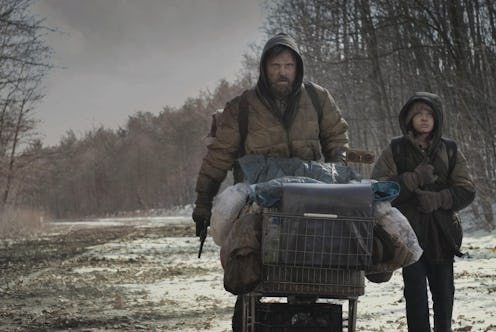Books
What If You Like the Movie Better than the Book?

I read Cormac McCarthy’s The Road quickly over the course of a couple of days, although I paused every few pages, putting the book in my lap and staring into space for maybe 10 minutes at a time (even at my most captivated, my mind wanders). I loved it, though it made my anxiety flare up as I questioned what sort of strength I would have to fight off cannibalistic tribes, days and days of darkness, and the urge to just end it all. I was nervous as I navigated through McCarthy’s wasteland; each time I put down the slim book, I’d imagine what his landscape looked like, how dry the air must be, and how cold the wind was. I didn't have to use my imagination long — I saw the movie only a few months later.
My boyfriend and I watched John Hillcoat’s The Road one cold night in my dark bedroom, on a small, dusty laptop screen. The movie was pretty faithful to the book, but some things were changed. A scene involving a cannibalized baby didn't make it into the film, for example, and the father and son (known as The Man and The Boy) at the center of the story were given more food and a bit more freedom to wander around on screen. The book was harsher and grimmer, but the movie scared me — thrilled me — in ways the book didn't.
I was more anxious watching The Road than I had been while reading it. The movie featured more flashbacks to The Man's suicidal wife, which emphasized the hopelessness of Earth's remaining inhabitants. The desolation of the planet's eternal winter was overwhelming on film; the colors and state of the world post-something was worse than I had imagined.The stakes seemed higher, too, which is always the case when you can actually hear the footsteps of danger, or see hunger in a man's cheekbones, or watch as someone opens a mysterious basement hatch. There were times when I literally had to look away. I cried when it was over, because I was sad and exhilarated and worried, and because all of my emotions come out of my eyes. It gave me that terrifying thrill that all horror movies do, the kind that I hate but also can't get enough of. My boyfriend reassured me that it wasn't real, but his work was for naught. I knew I was just seeing actors in front of a green screen, but that didn't seem to matter. When I’m home alone and scare myself to sleep, I still imagine some haunting images from the film.
I think of the book now as almost a blueprint. And that's not meant to insult McCarthy's unrivaled writing: there's just something different about reading about deserted interstates and actually seeing them. The book feels like a warning. The movie feels like the punishment.
There are other movies I prefer over their original texts, for similar seeing-is-believing reasons. I've read Jeffrey Eugenides’ The Virgin Suicides a few times, and savored each word as I did. But I've seen the movie more, and it’s Sofia Coppola’s vision and Air’s soundtrack that have stuck in my mind. The movie let me see things the book didn't. Again, that's no fault of the author, of course: I just couldn't, no matter how wonderfully descriptive his writing is, imagine the world he created. Or, no, that’s incorrect — I could conjure the feminine chaos of the Lisbon household, but Coppola’s imagining just seemed more right to me.
A friend of mine says that she liked the movie version of Forrest Gump much better than the book of the same name, written by Winston Groom. When I asked her why, she said that the original Forrest’s activities were just too outlandish — he goes to space with an orangutan and gets trapped on a desert island with cannibals — and that the movie, whose plot is admittedly outlandish, as well, does a better job at humanizing the characters. She couldn't relate to the original Forrest, but the Tom Hanks version connected her to the story.
My friend and I are both writers and readers. She's got excellent taste in clothes and a superb sense of humor. I don't think we prefer these movies because of lack of imagination. I think sometimes you just need another version of something, another explanation, to understand what's happening.
I can’t say that the literary The Road was better than the Viggo Mortensen-lead film version of The Road, because it really wasn't, even if my reaction was stronger. The book made me truly consider my own human nature, the deepest and darkest of my instincts, whereas the movie just gave me thrills and chills. I also wouldn't say I liked the movie better just because I’m too embarrassed to allow myself to think so. It doesn't seem right to admit to liking a movie more than its literary source, but what’s so wrong about it, really?
Seeing action unfold on a screen that is 20 feet tall is a completely different experience than seeing it written out. It's certainly easy to get snobbish when it comes to the movie versus book debate, but literature and film are both art — if someone has an emotional, resonant reaction to what they've been exposed to, shouldn't that be all that matters in the end?